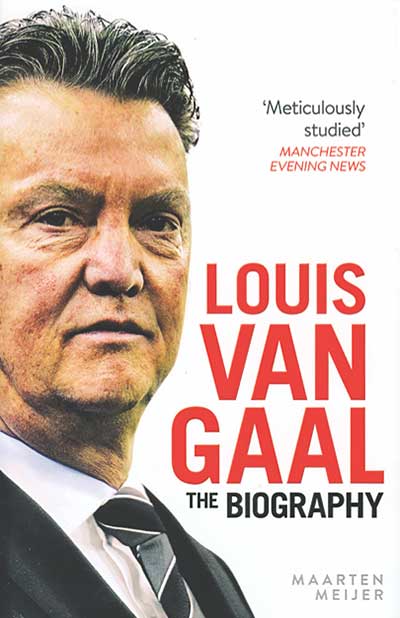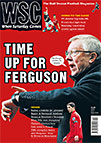 by Maarten Meijer
by Maarten Meijer
Ebury Press, £14.99
Reviewed by Joyce Woolridge
From WSC 333 November 2014
“When you traced the roots of the successful teams at the 2010 World Cup, every clue pointed back to one man: Louis van Gaal.” Maarten Meijer’s carefully researched biography is not afraid to make big claims for its subject. While conceding that credit is also due to Joachim Löw, Bert van Marwijk and Vicente del Bosque, Meijer argues that the controversial coach’s influence, through his work at Bayern Munich, Ajax and Barcelona, principally shaped the personnel, playing style and tactics of three of the four semi-finalists in South Africa. The book was finished before Holland’s unexpectedly barnstorming campaign in Brazil this summer and Germany’s victory (albeit also the Spanish collapse), which might serve as additional support for Meijer’s thesis on the extent of Van Gaal’s impact on European football.
It remains to be seen whether Van Gaal’s tenure at Old Trafford will provide further proof of the genius of “one of football’s most gifted architects”. The brief coda which deals with his United appointment, while stating the obvious that the £200 million “war chest” supposedly on offer “may have been an additional attraction” for Van Gaal, goes on to make the equally obvious observation that “he needs a new defence and a new midfield”. The final paragraph speculates that United will be his last management job and “he will want to go out with a bang, knowing that this is how he will be remembered not only in Manchester but in the entire world of football”, but reserves judgment on what sort of explosion Van Gaal will cause.
Meijer’s primary purpose in writing this heavyweight, thoughtful study, following his two previous biographies of Dick Advocaat and Guus Hiddink, is to balance the media caricature of Van Gaal, the crude stereotype of a lumbering, bombastic, dictatorial ex-PE teacher, ranting at the press and indulging in eccentric and bizarre behaviour (trouser-dropping, self-penned, excruciating poetry-reading) occasionally deemed akin to madness. Like Alex Ferguson, Meijer argues, Van Gaal is a man so out of style that he has become a “poster boy for the old-school, omnipotent, teacher-knows-best style of management”. So often following the boots of Johan Cruyff, as both player and coach, he has been cast as the anti-Cruyff, whereas his work should often be seen as complementary, Pep Guardiola’s all-conquering Barcelona being an amalgam of the philosophy of both coaches. In consequence there has been serious underestimation, if not misrepresentation, of Van Gaal’s talents and achievements. The real Van Gaal is more flexible and democratic in management and tactics, more humane and caring one-to-one.
Not that Meijer’s generally sympathetic account whitewashes over Van Gaal’s failings, or the barrage of criticism he has received, dealing with both at length. The most entertaining chapter predictably concerns Van Gaal’s fractious relations with the press. As boss of Ajax, he received a deliciously pompous letter from the Dutch Reporters’ Association, complaining press conferences were being “disgraced by vulgar shouting matches. This aggressive approach perhaps guarantees success with young, docile players but it is inappropriate at a press conference at which adult people are present”. At the next conference, in classic teacher mode, he asked those who signed it to put up their hands. Not one “adult” person did.
As a compatriot, Meijer could perhaps be forgiven his own excursions into national stereotypes. Van Gaal, he says, must be fundamentally understood as a typical Amsterdamer and Dutchman – hardnosed, unshakeably convinced he is right, highly focused, pig-headed, difficult to get along with and rebellious. Or as one journalist put it more succinctly: “An asshole, but certainly a competent asshole.”


